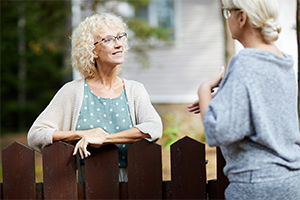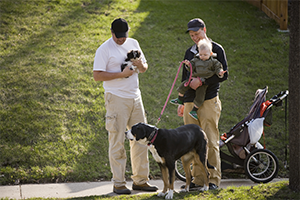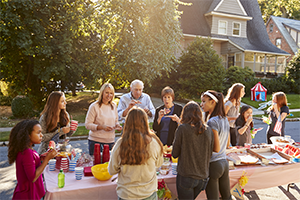How to be an Excellent Neighbor
Published on August 25, 2023 | 8 Minute read

Melanie
Ortiz Reyes
Content Specialist
Neighborhoods are where we lay down roots, create memories, and build connections with those around us. Simple acts of kindness, open communication, and a genuine desire to make a positive difference can transform a neighborhood into a close-knit community.
When you're on good terms with your neighbors, your living environment becomes a little cozier, more secure, and more enjoyable. Imagine having someone reliable to water your plants when you're on vacation or to lend you a cup of sugar when you're in the middle of baking your favorite cookies. Being a good neighbor means having a support system just a few steps away, ready to help in times of need. But it's not just about convenience. There's a deeper satisfaction in knowing you're contributing positively to the community's overall well-being.

Introduce yourself
The first step to being a good neighbor is a simple one: introduce yourself. When you take the initiative to introduce yourself, you signal to your neighbors that you are friendly, approachable, and interested in getting to know them. This initial act of friendliness can break down barriers and create an open atmosphere where neighbors feel comfortable reaching out to you if they have any concerns or need help.
Take a moment to chat, offer a smile, and say a friendly hello. Share a bit about yourself and your family, and show genuine interest in getting to know your new neighbors. Remember to exchange contact information when you meet them.
- Select a convenient and appropriate time
- Pay attention and listen to any names they share
- Ask genuine questions like "How long have you lived here?" "Know any good restaurants in the area?
Practice Respect and Courtesy
Respect and courtesy are the foundation of being a good neighbor. Be mindful of noise levels, especially during late hours. Keep your property well-maintained, and be considerate when parking your vehicles. If you're planning a gathering, inform your neighbors in advance to avoid any inconvenience. Don't forget about small acts of courtesy, like shoveling snow from your elderly neighbor's driveway or offering to help with heavy lifting, as they can make a big difference.
Participating in neighborhood activities and events is another way to show courtesy and build a sense of community, whether it's volunteering for community clean-up projects or attending neighborhood meetings.
- Ensure your pets are leashed and clean up after them
- Dispose of trash properly and on schedule
- Respect privacy by not intruding or snooping
Communicate Effectively
Maintaining open lines of communication is critical to maintaining positive neighborly relationships. Practice active listening by giving them your full attention, maintaining eye contact, and refraining from interrupting. If you have any issues or concerns, avoid confrontational or aggressive language and instead opt for a calm and friendly tone. This approach can prevent misunderstandings and help resolve conflicts amicably.
Non-verbal communication also plays a significant role in being a good neighbor. Smile and greet your neighbors when you see them, and use body language that conveys warmth and approachability.
If you foresee any changes or activities that might affect your neighbors, such as a home renovation or a tree removal, communicate your plans with them in advance.
- Address issues or concerns promptly
- Be willing to compromise and find mutually beneficial solutions
- Express gratitude for acts of kindness or assistance

Respect Boundaries
Boundaries can vary from person to person. What one neighbor may find acceptable, another may not. If you're uncertain about a particular boundary, asking your neighbor respectfully for clarification is perfectly fine. Being receptive to their needs and preferences demonstrates your commitment to being a considerate neighbor.
Respecting personal boundaries is vital. While it's great to be friendly, it's equally important to respect your neighbors' privacy. Avoid prying into their personal lives and be mindful of personal space. If they're not interested in forming a close friendship, respect their choice while maintaining a cordial relationship.
- Respect your neighbors' lifestyle choices and differences
- Be aware of cultural differences that may impact boundaries
- Don't ask intrusive questions about finances, relationships, or health unless they willingly share
Offer Neighborly Help
One of the most straightforward ways to be a great neighbor is by helping out. Pay attention to the needs and challenges your neighbors may face. It could be something as simple as assisting with groceries, shoveling snow from their driveway, or offering to help with yard work or childcare.
Instead of waiting for your neighbors to ask, be proactive and take the initiative when you notice they may need help. This attentiveness to their circumstances demonstrates your empathy and willingness to lend a hand when it's most needed.
- Offer to walk their dog or pet-sit when they're away
- While they're on vacation, offer to collect their mail and packages
- Offer to watch their children for a few hours if they need a break or have an appointment
Noise Etiquette
Noise has the potential to disrupt not only your neighbors' daily routines but also their overall quality of life, so excessive noise can be a significant source of tension among neighbors. Be mindful of the noise you generate, whether it's loud music, home improvement projects, or outdoor activities, and keep noise levels within reasonable limits, especially during late hours.
Respecting quiet hours is crucial. Most neighborhoods have designated hours during which noise should be minimized to allow for rest. Whether it's refraining from blaring music late at night or mowing your lawn at reasonable times, these small gestures go a long way in maintaining neighborly relations.
If your neighbors have concerns regarding the noise, be receptive to their feedback. Listen attentively and be open to finding compromises that work for both parties.
- Train and control pets to prevent excessive barking
- Inform your neighbors in advance if you plan to host a noisy event
- If you unintentionally create noise disturbances, apologize to your neighbors
- Avoid revving car engines or honking horns unnecessarily in residential areas

Celebrate Together
One of the most significant benefits of celebrating together is getting to know your neighbors on a deeper level. Sharing special occasions like holidays, birthdays, or cultural festivities can break down barriers and create connections.
Organizing neighborhood gatherings or community events can be a fantastic way to build a sense of community. Host a block party, a potluck dinner, or a neighborhood clean-up day. These events bring neighbors together, create lasting memories, and strengthen bonds.
- Start a neighborhood book club or board game night
- Collaborate on fundraising events to support local initiatives
- Acknowledge birthdays, anniversaries, or milestones of your neighbors
Resolve Disputes Gracefully
There may be disagreements or conflicts with neighbors occasionally, and open and respectful communication is key to resolving them. When a conflict arises, approach your neighbor calmly and constructively. Avoid confrontational or aggressive language, and instead, express your concerns or perspective in a non-blaming manner. Listen to their side of the story. This will show that you value their point of view.
Sometimes, disputes can become too heated for a one-on-one conversation. A neutral third party, like a community mediator or a respected neighbor, can help facilitate a discussion and guide both parties toward a mutually agreeable solution. After a disagreement has been resolved, maintain a courteous and respectful demeanor. Holding onto grudges or harboring ill feelings can create a hostile atmosphere in the neighborhood.
- Put yourself in your neighbor's shoes to gain insight into their concerns
- Avoid personal attacks or hurtful language
- Establish clear boundaries and agreements
Community Security
Finally, part of being a good neighbor is looking out for each other's safety and security. A safe and secure neighborhood benefits everyone! Keep an eye out for unusual or suspicious activity in your community and report it to the authorities if necessary.
Establishing a neighborhood watch program or online community group where neighbors can share information about safety concerns or incidents is an excellent way to stay informed and connected. These platforms allow for the rapid dissemination of information about local crime trends or safety measures, helping residents stay proactive in safeguarding their homes and families. A safe neighborhood is a happy neighborhood!
- Watch out for children's safety, especially near streets and driveways
- Encourage safe play and traffic awareness
- Offer assistance during crises like power outages and natural disasters
Being a good neighbor is about creating a sense of unity, respect, and kindness in your community. Whether you've just moved to a new neighborhood or want to enhance your existing connections, these tips can help you become the neighbor everyone appreciates. By fostering goodwill and practicing neighborly virtues, you'll improve your quality of life and contribute to creating a warm, welcoming, and harmonious community.